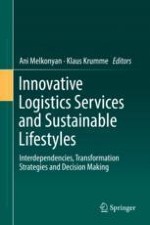2019 | OriginalPaper | Buchkapitel
2. Supply Chains and Systems of Sustainability: An Attempt to Close the Gap
verfasst von : Klaus Krumme
Erschienen in: Innovative Logistics Services and Sustainable Lifestyles
Aktivieren Sie unsere intelligente Suche, um passende Fachinhalte oder Patente zu finden.
Wählen Sie Textabschnitte aus um mit Künstlicher Intelligenz passenden Patente zu finden. powered by
Markieren Sie Textabschnitte, um KI-gestützt weitere passende Inhalte zu finden. powered by
